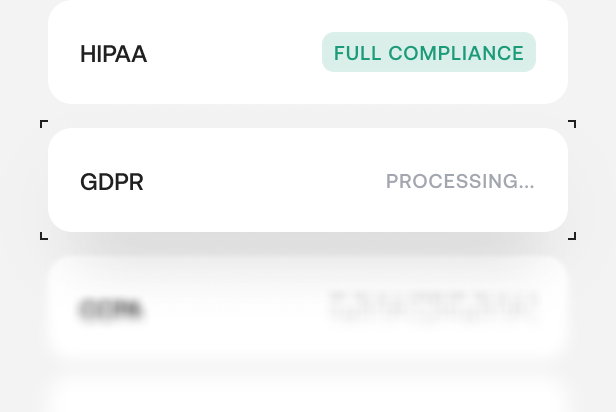Compliant Mortality Analytics
Launch powerful healthcare research initiatives while maintaining strict data privacy compliance and maximizing analytical value




Enable Privacy-Compliant Mortality Data Access
Our solution rapidly assesses and certifies mortality data for privacy compliance, enabling faster access to critical insights for research outcomes and population health initiatives

Partner With Mortality Data Experts Who Listen
Our expert team is committed to understanding your unique research challenges and compliance needs in mortality analytics
FAQ
Integral distinguishes itself through dramatically faster processing times for mortality data privacy assessments, extensive automation of compliance workflows, and continuous monitoring instead of periodic certifications. The platform uniquely emphasizes preserving data utility alongside privacy, offering unparalleled transparency into privacy-utility tradeoffs. Our collaborative approach with partners like Veritas Data Research, rapid compliance certification capabilities, and seamless integration with existing data workflows set us apart. Integral provides a comprehensive solution combining privacy assessment, compliance certification, and regulatory guidance tailored specifically for mortality data's complex privacy requirements.
Integral enables compliant mortality data sharing through secure transfer infrastructure, continuous compliance monitoring, and standardized de-identification methods. The platform integrates with data clean rooms, provides cross-organization privacy assessments, and allows for compliant mortality data enrichment. Granular access controls and detailed audit trails enable healthcare organizations to securely collaborate on sensitive mortality research projects while maintaining regulatory compliance and protecting patient privacy.
Integral is designed to work with diverse mortality data sources and healthcare datasets. This includes structured and unstructured mortality records, death certificates, obituary data, funeral home records, Social Security Administration data, hospital discharge summaries, and claims data. The platform can handle both raw and de-identified datasets from various stakeholders in the healthcare ecosystem, supporting common data formats used in mortality research and population health analytics.
Integral's platform is designed to comply with a comprehensive range of privacy regulations beyond HIPAA when handling mortality data linked to healthcare information. This includes state-level privacy laws, federal research regulations, IRB requirements, emerging AI/ML standards, and industry-specific requirements across healthcare, life sciences, and public health sectors. Our expert team's adaptable approach allows us to stay current with evolving privacy laws and research ethics standards both domestically and internationally.
Integral optimizes mortality data utility while ensuring privacy through risk-based assessments tailored to specific research use cases. The process is contained within the Privacy Workbench platform, which offers flexible remediation options, granular data transformations, and can recommend additional mortality data sources to fill analytical gaps. Custom attributes and continuous monitoring help preserve research value. Integral's expert team provides guidance on balancing utility and compliance for each unique mortality research project, with full transparency into privacy-utility tradeoffs.
Yes, Integral offers comprehensive mortality data privacy assessments alongside compliance certification. Our solution automatically evaluates privacy risks, identifies potential re-identification concerns, and provides tailored recommendations for remediation. We offer expert guidance on privacy-preserving techniques, risk mitigation strategies, and regulatory compliance pathways. Integral's collaborative approach combines automated privacy assessment with expert guidance to help organizations safely utilize mortality data while maintaining the highest privacy standards.
Integral's automated process dramatically reduces certification time by utilizing an "expert-in-the-middle" approach specifically designed for mortality data complexity. The system automatically assesses privacy risks in mortality datasets, streamlines compliance workflows, and suggests tailored remediations, while human certifiers validate the automated compliance process and provide expert oversight. The process is supported by the Privacy Workbench platform and offers continuous monitoring instead of periodic manual reviews. This tech-driven approach allows Integral to cut mortality data certification timelines from months to days or even hours in many cases.























